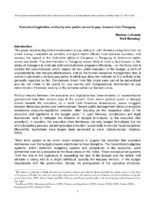| dc.contributor.author | Lafuente, Mariano | |
| dc.contributor.author | Manning, Nick | |
| dc.date.accessioned | 2018-09-02T06:07:44Z | |
| dc.date.available | 2018-09-02T06:07:44Z | |
| dc.date.issued | 2009-10 | |
| dc.identifier.uri | http://cladista.clad.org//handle/123456789/5671 | |
| dc.description.abstract | This paper reviews the impact of the distinctive ability of Congress in Paraguay to determine public sector pay levels. Pay determination in Paraguay seems likely to have a dual impact on the ability of managers to motivate staff and implement programs effectively - on the fiscal side it creates the circumstances which require ad hoc under-execution of the budget, a form of unpredictability that reduces effectiveness, and on the human resources management side, it seems to generate a de facto pay policy in which pay does not motivate as it is unlikely to be generally regarded as fair. Conclusions drawn from this single case cannot be generalized and do not intend to be useful for any country with Congressional involvement in pay determination. However, looking at this extreme outlier can be instructive as there are implications for public management reforms in Paraguay and for public sector management data collection. | |
| dc.description.abstract | In Paraguay, as Congressional involvement will not be reduced in the short term, one possible approach is to introduce, gradually, a variant on a "Single Pay Spine" model in which the relativities between different posts and occupational streams can be assessed and reviewed - and, crucially, where the fiscal impact of an aggregate pay increase can be readily assessed and, potentially, incorporated into a more formal process in which the fiscal space for salary increases is set by the Ministry of Finance at the start of the budget process. | |
| dc.description.abstract | As in many areas of public sector human resources management, there are significant gaps in our knowledge and we rely on commonly-perceived wisdom and self-proclaimed best practices. There are three areas of new data collection that would allow a more nuanced understanding of the impact of arrangements such as that in Paraguay - these are set out at the end of the paper. | |
| dc.format.extent | 16 p. | |
| dc.language | Inglés | |
| dc.publisher | The World Bank. Latin America and Caribbean Region. Public Sector Management | |
| dc.rights | Creative Commons BY-SA-NC 4.0 Int | |
| dc.rights.uri | http://creativecommons.org/licenses/by-nc-nd/4.0/ | |
| dc.subject | CONGRESO CLAD 14-2009 | |
| dc.subject | REMUNERACION | |
| dc.subject | FUNCION PUBLICA | |
| dc.subject | SECTOR PUBLICO | |
| dc.subject | PERSONAL PUBLICO | |
| dc.subject | PODER EJECUTIVO | |
| dc.subject | PODER LEGISLATIVO | |
| dc.subject | ESTUDIO DE CASOS | |
| dc.title | Executive-Legislative authority over public servants pay: lessons from Paraguay | |
| dc.type | article | |
| clad.congress | Congreso Internacional del CLAD sobre la Reforma del Estado y de la Administración Pública, 14 | |
| clad.key | MFN42428--42428 | |
| clad.key1 | KEY42428 | |
| clad.region | PARAGUAY | |
| clad.md5 | 6697f9d062f38271ffb5dd6dcd77b916 | |


